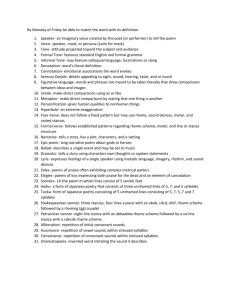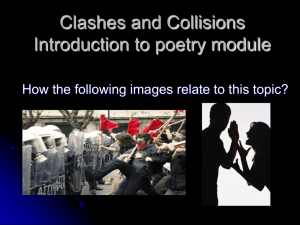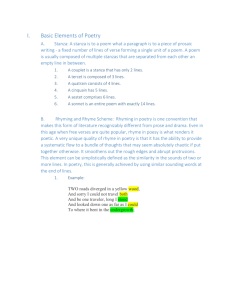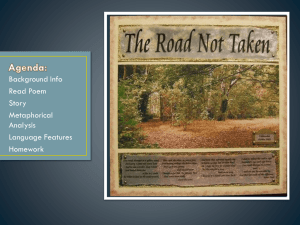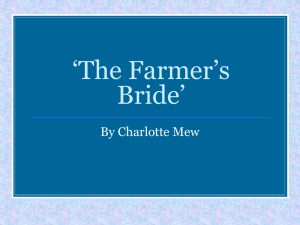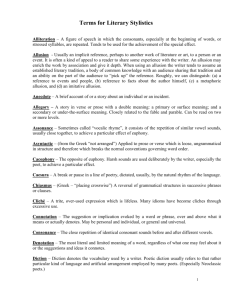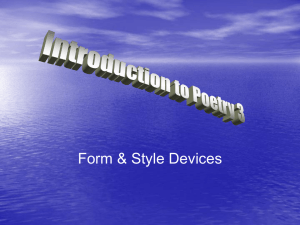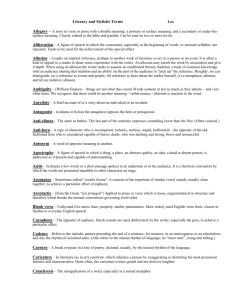lit terms comprehensive 2015
advertisement
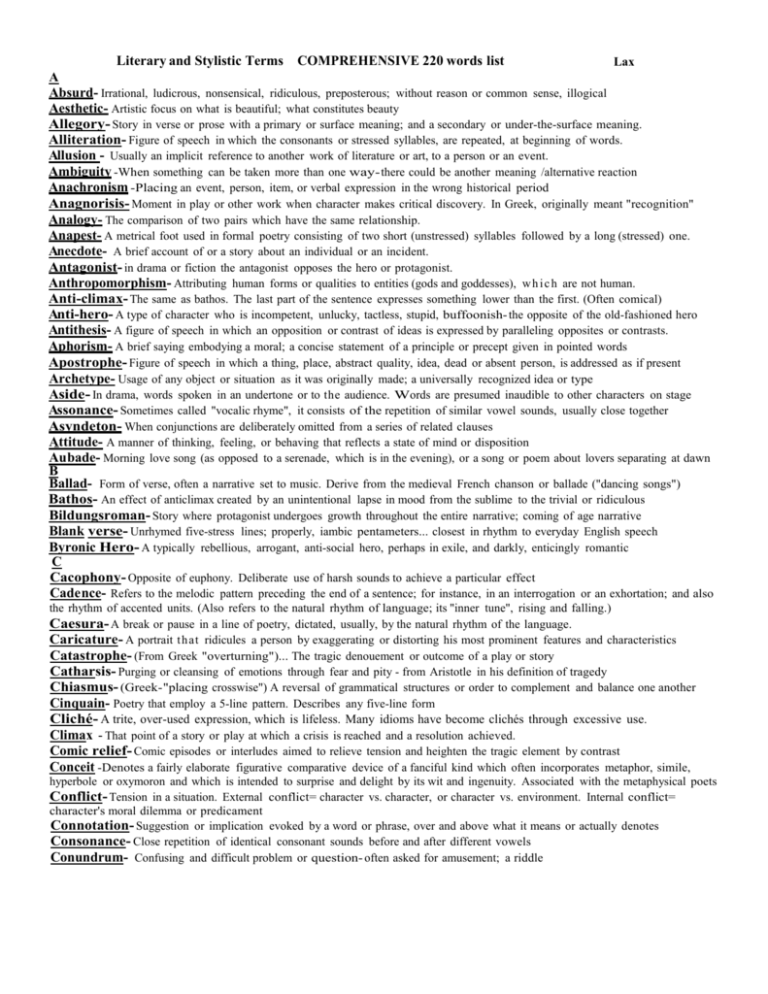
Literary and Stylistic Terms COMPREHENSIVE 220 words list Lax A Absurd- Irrational, ludicrous, nonsensical, ridiculous, preposterous; without reason or common sense, illogical Aesthetic- Artistic focus on what is beautiful; what constitutes beauty Allegory- Story in verse or prose with a primary or surface meaning; and a secondary or under-the-surface meaning. Alliteration- Figure of speech in which the consonants or stressed syllables, are repeated, at beginning of words. Allusion - Usually an implicit reference to another work of literature or art, to a person or an event. Ambiguity -When something can be taken more than one way- there could be another meaning /alternative reaction Anachronism -Placing an event, person, item, or verbal expression in the wrong historical period Anagnorisis- Moment in play or other work when character makes critical discovery. In Greek, originally meant "recognition" Analogy- The comparison of two pairs which have the same relationship. Anapest- A metrical foot used in formal poetry consisting of two short (unstressed) syllables followed by a long (stressed) one. Anecdote- A brief account of or a story about an individual or an incident. Antagonist- in drama or fiction the antagonist opposes the hero or protagonist. Anthropomorphism- Attributing human forms or qualities to entities (gods and goddesses), w h i c h are not human. Anti-climax- The same as bathos. The last part of the sentence expresses something lower than the first. (Often comical) Anti-hero- A type of character who is incompetent, unlucky, tactless, stupid, buffoonish- the opposite of the old-fashioned hero Antithesis- A figure of speech in which an opposition or contrast of ideas is expressed by paralleling opposites or contrasts. Aphorism- A brief saying embodying a moral; a concise statement of a principle or precept given in pointed words Apostrophe- Figure of speech in which a thing, place, abstract quality, idea, dead or absent person, is addressed as if present Archetype- Usage of any object or situation as it was originally made; a universally recognized idea or type Aside- In drama, words spoken in an undertone or to the audience. Words are presumed inaudible to other characters on stage Assonance- Sometimes called "vocalic rhyme", it consists of the repetition of similar vowel sounds, usually close together Asyndeton- When conjunctions are deliberately omitted from a series of related clauses Attitude- A manner of thinking, feeling, or behaving that reflects a state of mind or disposition Aubade- Morning love song (as opposed to a serenade, which is in the evening), or a song or poem about lovers separating at dawn B Ballad- Form of verse, often a narrative set to music. Derive from the medieval French chanson or ballade ("dancing songs") Bathos- An effect of anticlimax created by an unintentional lapse in mood from the sublime to the trivial or ridiculous Bildungsroman- Story where protagonist undergoes growth throughout the entire narrative; coming of age narrative Blank verse- Unrhymed five-stress lines; properly, iambic pentameters... closest in rhythm to everyday English speech Byronic Hero- A typically rebellious, arrogant, anti-social hero, perhaps in exile, and darkly, enticingly romantic C Cacophony- Opposite of euphony. Deliberate use of harsh sounds to achieve a particular effect Cade nce- Refers to the melodic pattern preceding the end of a sentence; for instance, in an interrogation or an exhortation; and also the rhythm of accented units. (Also refers to the natural rhythm of language; its "inner tune", rising and falling.) Caesura- A break or pause in a line of poetry, dictated, usually, by the natural rhythm of the language. Caricature- A portrait t h at ridicules a person by exaggerating or distorting his most prominent features and characteristics Catastrophe- (From Greek "overturning")... The tragic denouement or outcome of a play or story Catharsis- Purging or cleansing of emotions through fear and pity - from Aristotle in his definition of tragedy Chiasmus- (Greek-"placing crosswise") A reversal of grammatical structures or order to complement and balance one another Cinquain- Poetry that employ a 5-line pattern. Describes any five-line form Cliché- A trite, over-used expression, which is lifeless. Many idioms have become clichés through excessive use. Climax - That point of a story or play at which a crisis is reached and a resolution achieved. Comic relief- Comic episodes or interludes aimed to relieve tension and heighten the tragic element by contrast Conceit -Denotes a fairly elaborate figurative comparative device of a fanciful kind which often incorporates metaphor, simile, hyperbole or oxymoron and which is intended to surprise and delight by its wit and ingenuity. Associated with the metaphysical poets Conflict- Tension in a situation. External conflict= character vs. character, or character vs. environment. Internal conflict= character's moral dilemma or predicament Connotation- Suggestion or implication evoked by a word or phrase, over and above what it means or actually denotes Consonance- Close repetition of identical consonant sounds before and after different vowels Conundrum- Confusing and difficult problem or question- often asked for amusement; a riddle Couplet- Two successive rhyming lines Crisis - Stage in a sequence of events at which future events, especially for better or for worse, is determined; turning point D Dactyl- Poetic foot that has a long (stressed) syllable followed by two short (unstressed) syllables Denotation- Most literal meaning of a word, regardless of what one may feel about it or the suggestions and ideas it connotes Denouement- (French-"unknotting") ... the unraveling of a plot's complications at the end of a story or play Diction- Writer's vocabulary usage and choice of words. Dissonance- Arrangement of cacophonous sounds in words, or rhythmical patterns, for a particular effect Dogma- A tenet, doctrine, law or principle. Something laid down as being so Dramatic irony- When audience knows implication and meaning of a situation or what is being said, but the characters do not Dumb-show- A mimed dramatic performance whose purpose was to prepare the audience for the main action of the play to follow Dystopia -Imagined place or state in which everything is unpleasant or bad, typically a totalitarian or environmentally degraded one E ElegyEllipsis- (Greek-"leaving out") A figurative device where a word/ words are omitted in order to achieve more compact expression End-stopped rhyme- Occurs at the end of a line or verse. Distinguished from head-rhyme or alliteration & internal rhyme Enjambment- Running on of the sense beyond the second line of one couplet into the first line of the next. Epic- Long narrative poem, on a grand scale, about the deeds of warriors and heroes. Incorporates myth, legend, and history EpigramEpiphany- (Greek-"manifestation") Denotes festival which commemorates the manifestation of Christ to the Gentiles. In literature, denotes an awareness or awakening' a realization Epithet - Usually an adjective or phrase expressing some quality or attribute which is characteristic of a person or thing Euphony- The terms denotes pleasing, mellifluous sounds, usually produced by long vowels rather than consonants. ExegesisExistentialism- Vision of the condition and existence of man that existence precedes essence. Man fashions his own existence and only exists by so doing, and in that process, and by the choice of what he does or does not do, gives essence to that existence ExpositionExtended Metaphor - F FableFalling action- That part of a play that follows the denouement or climax FantasyFarceFeminine Rhyme Fiction - A vague and general term for an imaginative work, usually in prose Fixed form -In poetry when there are prescribed and established rules with regard to number of lines, meter, line length, rhyme etc. Flashback- Describes any scene or episode that is inserted to show events that happened at an earlier time Flat characterFoilFoot- Group of syllables forming a metrical unit; a unit of rhythm. We measure feet in terms of syllable variation Foreshadowing- Technique of arranging events and information in a narrative so that later events are prepared for beforehand Frame Story Freytag's PyramidG Gallows Humor Genre- A kind; a literary type or class. For example: epic, tragedy, poem, comedy, satire, novel, novella, short story, etc. GothicGreat Chain of Being- An idea that everything in the created order is part of natural hierarchy, from the lowest possible to God (insect, fish, bird, beast, man, angel, God) Greek Tragedy- Had a definite structure- a prologue, chorus, episodes, conclusion, and constituted 5 Acts. H HaikuHamartiaHeroic CoupletHexameterHubris- Excessive pride... a shortcoming or defect in Greek tragic hero leads him to ignore warnings of the gods and to transgress their laws and commands. Eventually hubris brings about downfall and nemesis HumoursHyperbole- A figure of speech which contains an exaggeration for emphasis Hypotaxis- (Greek: "Under arrangement") Subordination; syntactic relationship between dependent and independent constructions I Iambic pentameter- Denotes a line of five feet, arranged as unstressed, followed by stressed syllables. (Shakespearean Sonnet) IdeologyIdiomIdyll- Refers to either a poem or episode which describes a scene in rural life, or a description of any scene of tranquil happiness Imagery- Use of language to represent objects, actions, feelings, thoughts, ideas, and any sensory or extra-sensory experience In Medias Res Interior MonologueInternal RhymeInversionIrony- Most forms involve the perception or awareness of a discrepancy or incongruity between words and their meanings, or between actions and their results, or between appearance and reality. Basic kinds are verbal, dramatic, and situational J Jargon Juvenalian SatireJuxtaposition K Kafkaesque- Characteristic of the nightmarish atmosphere which Franz Kafka was capable of creating through pervasive menace of sinister forces, feelings of loss of identity, guilt and fear, and a sense of permeating evil and an "absurd" logic of ruling powers L LampoonLimerickLitoteLyric- From Greeks, a song to be sung accompaniment by the lyre, but also describes a particular kind of poem in order to distinguish it from narrative or dramatic verse of any kind. Usually fairly short and personal M Malapropism- From Mrs. Malaprop in Sheridan's The Rivals, who had the habit of using polysyllabic words incorrectly MarxismMasqueMedieval DramaMeiosisMelodrama Metaphor- Figure of speech in which one thing is described in terms of another. A comparison is usually implicit Metaphysical- Term applied to 17'" century poets (Donne, Marvell, et a[) who used arresting original images and conceits , wit, ingenuity, and intellectual stretching to express their passions and beliefs in their poetry Meter- (Greek: "Measure") Refers to the pattern of stressed and unstressed syllables in verse Metonymy- ("Name change") Figure of speech in which name of an attribute or a thing is substituted for the thing itself Mock EpicModernismMonologue- A single person speaking alone- with or without an audience MoodMoral- The lesson to be learnt from a story, poem, play or fable- any work which purports to teach anything. Motif- One of dominant ideas in a work of literature; a part of main theme. A recurring image, idea, or verbal pattern Myth- A story that is not "true" and which usually involves the supernatural. Myths explains how something came to exist N Narrative VerseNeo-classicalNonfictionNovellaNuance0 Objective details- Suggest that writer is "outside of" and detached from what he is writing about Octave- Also known as an octet... A group of 8 lines- either in stanza form or as the first 8 lines of a sonnet (abbaabba) Ode- (Greek: "song") A lyric poem, usually of some length. Contains an elaborate stanza structure, a marked formality and stateliness in tone and style, and lofty sentiments and thoughts. Public ode is ceremonious, while private ode is personal. Oedipus complex Onomatopoeia- (Greek: "Name-making") ... the formation and use of words to imitate sounds. Used for a special effect Oxymoron- Figure of speech which combines incongruous and apparently contradictory words and meanings for a special effect P PantomimeParadox- Apparently self-contradictory statement that contains a truth reconciling the conflicting opposites Parallelism- When phrases or sentences of similar construction and meaning placed side by side, balancing each other Paraphrase Parataxis- Co-ordination of clauses without conjunctions. The effect is terseness and compression. (See Pope, Dickinson) ParodyPastoralPathos- (Greek: "suffering; feeling") That quality of art that evokes feelings of tenderness, pity or sorrow. Persona- (Latin: "Mask") Denotes the "person" who speaks in a poem or novel or other form of literature. Personification -Impersonation or embodiment of human quality; the attribution of human qualities to inanimate objects Plot- Plan, design, scheme or pattern of events in a work and the organization of incident and character Prolepsis- (Greek: "Anticipation") A figurative device by which a future event is presumed to have happened Prologue- Opening section of a work; a kind of introduction that is part of the work and not prefatory Prose -Direct, unadorned form of language, written or spoken, in ordinary usage. Not restricted in rhythm, measure or rhyme Protagonist- The principal actor or character. Has come to be the equivalent of the hero Pun- A figure of speech, which involves a play upon words. Gives rise to a fairly universal form of humor. Q Quatrain- A stanza of four lines rhymed or unrhymed. It lends itself to a wide variation in meter and rhyme R RealismRefrain- A phrase, line or lines repeated at intervals during a poem and especially at the end of a stanza Renaissance- (French: "Rebirth") A term commonly applied to the historical period which follows the Middle Ages. (15'"- 16'" centuries) (See Dante, Cervantes, Sir Thomas More, Edmund Spenser, Shakespeare, Sir Francis Bacon) Revenge TragedyRhetorical question- A question not expecting an answer, or one to which the answer is more or less self-evident Rhyme- When words sound alike ... Echoes sounds Rhythm - Movement or sense of movement communicated by arrangement and duration of syllables Roman a clefRomanticism -Shift in 18'" century England in sensibility and feeling, particularly in relation to the natural order and Nature. Aspects include: an increasing interest in Nature, and the natural, primitive and uncivilized way of life, subjective feelings, emphasis on need for spontaneity in thought and action and in the expression of thought, importance attached to power of the imagination, a tendency to exalt the individual and his needs and emphasis on the need for a freer and more personal expression, and the cult of the Noble Savage. (See Blake, Coleridge, Keats, Shelley, Wordsworth, Byron) S SarcasmSatire -Its true end is to amend vices... Satirist's aim is to ridicule and bring scorn to those who threaten to impair a sense of their values and beliefs. Satire ridicules the follies, vices and shortcomings of society, and of individuals who represent society Sentimentalitv Sestet- The sub-division or last six lines of the Italian sonnet following the octave Setting- The where and when of a story or play; the locale. Involves atmosphere, context, weather, time, etc. Simile- A figure of speech in which one thing is likened to another using the words "like" or "as" Situational Irony Soliloquy- A soliloquy is a speech, often of some length, in which a character, alone on stage, expresses his thought and feelings. It is an accepted dramatic convention of great importance. Shows a character's intentions, motives, feelings, etc. Sonnet- A poem of 14 lines, usually in iambic pentameter with considerable variation in rhyme scheme. SpondeeStanza- A group of lines of verse. The stanza is the unit of structure in a poem. Stereotvpe Stock character- A recurrent "type", such as: the oaf, the clown, the coward, the nagging wife, the buffoon, etc.) Stream of consciousness- Denotes the flow of inner experiences. Depicts multitudinous thoughts and uncensored feelings Subjective details -When the writer is concerned with conveying personal experience and feeling from a personal point of view Sub-plot- A subsidiary action in a play or story which coincides with the main action Suspense- A state of uncertainty, anticipation and curiosity as to the outcome of the story, play, or prose SyllableSymbol- Animate or inanimate object or action which represents or "stands for" something else (may be universal or local) Synesthesia- Mixing of sensations; concurrent appeal to more than one sense; response through several senses Synecdoche -Figure of speech in which the part stands for the whole, thus something else is understood within the thing mentioned Syntactic DoublingSyntax- (Greek: "Together arrangement") Sentence construction or arrangement T TableauTercet- A stanza of three lines linked by rhyme. Also as one of a pair of triplets which makes up the sestet of a sonnet Theme-The theme of a work is not its subject but rather a specific large, central idea, which may be stated directly or indirectly Tone- The reflection of a writer's attitude, manner, mood and moral outlook in his work Tragedy- Originally denoted a form of ritual sacrifice accompanied by choral song in honor of Dionysus, the god of drama, the fields and the vineyards. (See Aristotle's "Poetics".) Tragedy is the disaster that comes to those who represent and who symbolize, in a peculiarly intense form, those flaws and shortcomings that are universal in a Jesser form Tragic flaw-Traditionally that defect in a tragic hero or heroine which leads to their downfall Trilogy- A group of three tragedies. Also a group of 3 works linked by common theme or characters TrimeterTrocheeTropeTurning point- Observable moment in a story, play or other narrative, where there is a definite change in direction; crucial point. u UnderstatementUniversality -When something transcends limits of a particular situation, place, time, or person and is applicable beyond the work UtopiaUnreliable Narrator- v Verbal Irony- Verisimilitude- Likeness to the truth; the appearance of being true or real even when fantastic Vernacular- Domestic or native language. Now applied to the language used in one's native country Verse-Three meanings: (a) a line of metrical writing; (b) a stanza; (c) poetry in general Vignette Villanelle VillainVolta- w Willing suspension of disbelief- Reader I audience is "asked" to accept dramatic conventions of the theatre and the stage Wit- Formerly meant common sense. During the Renaissance it meant uintelligence" or "wisdom"; thus intellectual capacity. Later, wit came to mean "fancy", as in the imagination. Wit mostly suggests intellectual brilliance and ingenuity; verbal deftness. X Xanaduism – Y Yarn Z Zeitgeist Zeugma - (Compiled by Jill Lax. Taken from The Penguin Dictionary of Literary Terms. Literary Theory: Cuddon, J.A. 3rd edition and http://www.tnellen.com/cybereng/lit_terms/)

